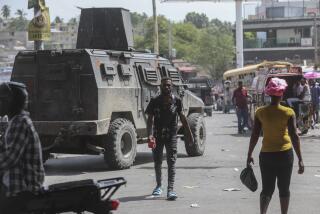. . . but Peacekeepers Must Be Kept in Check
- Share via
United Nations peacekeeping operations, and the resources and personnel devoted to them, are again on the rise. This increase, in turn, raises questions about the U.N.’s capacity to handle so much new business effectively and the wherewithal to support it. Unfortunately, one major issue has not received adequate attention: whether the U.N. Secretariat is unnecessarily expanding its missions--and thereby their complexity and cost--in pursuit of a larger institutional agenda without adequate oversight by the Security Council. The case of Ethiopia and Eritrea is a good case study of the problem.
The parties signed a cease-fire agreement on June 18, after a year of armed conflict and a bloody struggle for Eritrean independence before that. The Security Council authorized deployment of 100 military observers, currently under preparation. The council also requested further planning for the U.N.’s role. Secretary-General Kofi Annan supplied a report on Aug. 10, recommending an additional 120 military observers, plus three infantry battalions, land-mine clearance units and accompanying logistical support, for a total strength of 4,200 personnel. The council is now considering the report.
The central philosophical and policy issue is posed by the proposal for infantry battalions. What exactly are they supposed to do? Monitoring compliance with a cease-fire and the disengagement of combatant forces are tasks eminently suited to military observers, a classic peacekeeping task. If 220 military observers are insufficient, then no one would quarrel with an appropriate increase. But by recommending three infantry battalions and their attendant logistical support, the secretary-general has added an entirely new and unnecessary dimension to the U.N. Mission in Ethiopia and Eritrea, or UNMEE. This is not simply a budgeteer’s bean-counting quarrel over personnel levels, but a fundamental disagreement about the most appropriate and feasible role for the U.N. in international conflicts.
Peacekeeping historically has relied on the consent of and cooperation by parties to a conflict. Where that is absent, not only does peacekeeping fail, but so too will “peace” itself.
Many U.N. advocates are dissatisfied with the limited U.N. role such hard-headed assessments imply. Annan, for one, has been very explicit about his preference for transforming “peacekeeping” into something else: “to go in prepared for all eventualities, including full combat.” This week’s U.N. report recommending expanded peacekeeping resources is more of the same.
The three infantry battalions proposed for UNMEE are admittedly but a small step toward “full combat” preparedness, but it is in any case the wrong step in the wrong direction. If the Ethiopian-Eritrean cease-fire breaks down, military observers will be able to detect and report it for appropriate political or diplomatic action. Moreover, if such a breakdown occurs, signaling a true political disagreement, the three infantry battalions will neither resolve the dispute nor be numerous enough to deter combat. They certainly will not be able to “enforce” the parties’ compliance with a disintegrating peace agreement. In the end, if Ethiopians and Eritreans are not willing to uphold their own peace, what other nationality is willing to kill and die for it?
So what is the point of the proposal to deploy the three battalions? Perhaps it is simply idealism about the U.N. role, but more likely it reflects a determination (fully supported by the Clinton administration) to make the U.N. Secretariat a more active player in international disputes. But introducing a substantial outside presence into such a conflict is no guarantee of increased security--for the parties or the U.N. observers--and it may contribute to greater animosities if one side (or both) sees the U.N. assuming an openly partisan role.
Abandoning the U.N.’s historical peacekeeping role--relying on the consent of the parties and U.N. neutrality--as has been done all too often in recent years is a prescription for higher U.N. expenses, more failures and less support in Washington. By all means, send military observers to the Horn of Africa, but keep the three infantry battalions home.
More to Read
Sign up for Essential California
The most important California stories and recommendations in your inbox every morning.
You may occasionally receive promotional content from the Los Angeles Times.












